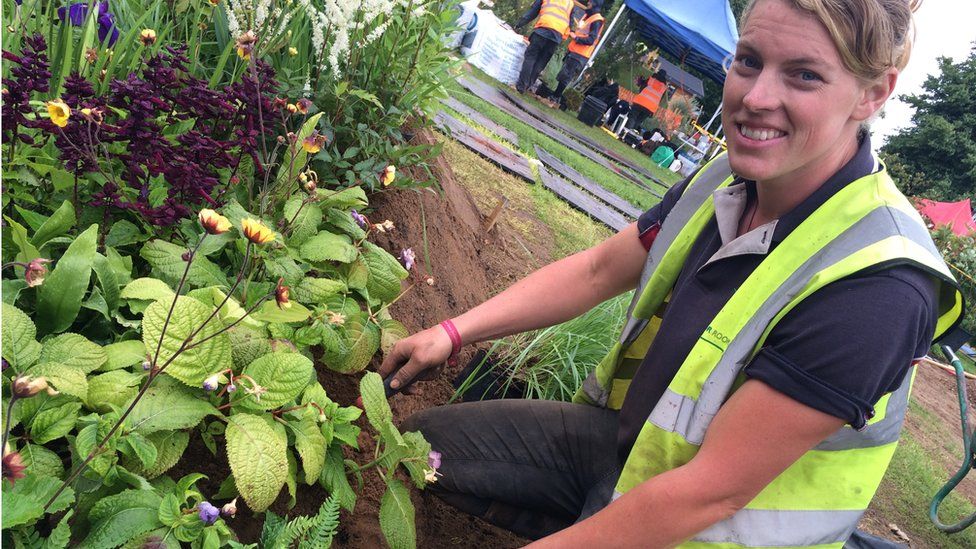Can gardening improve the nation's health?
- Published

Amanda Miller has her hands in the soil as she builds a garden in the grounds of Hampton Court Palace.
Crouched on a bank beside a stream, she is putting the final touches to a garden that attempts to convey the solitude of depression.
Her creation is one of several at the RHS Hampton Court Flower Show exploring links between health and horticulture.
"The one I've focused on is depression because I have family members and friends who have suffered from it," she says.
"Rather than being inspired to do it, I was compelled to do it."
A few days before the opening of the show, her garden, The Outside Room, is taking shape, despite the rain.
The periphery of the garden contains lush bright planting, which becomes sombre and sparse as you cross a dark moat on to a crumbling island.
"This signifies the sinking feeling and the darkness people suffering from depression will experience," says Amanda, who became a garden designer after a career in the military.
She hopes visitors to the garden will respond to the connection with nature.
"I was at sea for six months, and I didn't see any greenery," she says.
"And, when you get on land, it is a different, very different feeling in connecting with nature.
"I think these two things run hand in hand with recovery and relaxation and all those sorts of things."
Memory garden
Nearby, Carolyn Dunster and Noemi Mercurelli are working on their cut-flower garden for a charity called Katie's Lymphoedema Fund.
"We're creating the garden in memory of Katie Wohlrab who died of breast cancer when she was in her early 30s," says Carolyn.
"At that point she had just got married and she had started creating a small cut-flower garden herself - and she loved flowers, and, when she was particularly ill, they offered her comfort and solace."
The flowers are laid out in rows for easy picking with a colour palette of pale pinks and burgundies.
The garden also contains dried seed heads to sow again next year.
"The idea of the cut-flower garden is that it represents joy and positivity and also the cyclical life of nature," says Carolyn, who finds working with plants therapeutic.
"The idea is that people will love the garden - they'll see what they can grow for themselves in a tiny space and that no space however small or however urban is too small to grow your own cut flowers, which will actually bring you a huge amount of joy and happiness."
There is a growing body of research that suggests gardening is good for both physical and mental health.
Pilot schemes for GPs to prescribe gardening are under way, while school gardening projects have been set up to give children a peaceful space to relax in.
There are also community garden schemes where patients at GP practices work together to grow food, while studies have shown that exposure to gardens can have a calming effect in dementia.
Smelling the roses
At a health and horticulture conference at the Hampton Court Flower Show on Monday, experts from public health, horticulture and academia are meeting to discuss the role gardening can play in the fight against chronic health conditions.
Sue Biggs, director general of the Royal Horticultural Society, has spoken of how the beauty of plants in her garden helped her recover from breast cancer.
She says gardening is also a way to heal communities.
"It's not just about gardening and horticulture it's also about happiness, because I can't think of a better thing to make people happy - and they are tough times at the moment - and I think gardening, it's just a joy," she says.
"When you walk out into a garden and you literally smell the roses and see the bees buzzing on the lavender and just look at all that beautiful colour and scent, you can't help but feel happier, and that can't be a bad thing can it?"
Back at the show ground, show manager Dave Green is taking a well-earned break in the catering tent, as the rain steps up.
"This year we've had a really wet build, which is quite unusual for this midsummer time of year, which has made it quite a challenge," he says.
Despite the wet weather, he seems remarkably unruffled.
"There's a lot of stuff going on, but there's lots of ways of dealing with that - just taking it one thing at a time and gardening is really good at making you realise that things happen over a long period of time," he says.
"So although it's frantic now - the show week, the build, the breakdown - it's a long period of time and you've got to make sure you can sustain that.
"And gardening - with the way the plants develop slowly, day by day, I think has a really good message for trying to deal with that."
Follow Helen on Twitter.
- Published8 July 2015